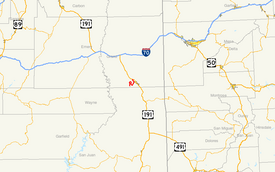SR-279 (UT)
| State Route 279 | ||||
|---|---|---|---|---|
| Potash-Lower Colorado Scenic Byway | ||||
 |
||||
| Route information | ||||
| Defined by Utah Code §72-4-133 | ||||
| Maintained by UDOT | ||||
| Length: | 15.178 mi (24.427 km) | |||
| Existed: | 1960 – present | |||
| Major junctions | ||||
| South end: | Potash mine along Colorado River | |||
| North end: |
|
|||
| Highway system | ||||
|
||||
State Route 279 is a state highway in the U.S. state of Utah. The highway was constructed in 1962–1963 to service the Cane Creek potash mine and processing plant southwest of Moab. The highway was named one of the most beautiful highways opened to traffic in 1963. The entire length of SR-279 has been designated the Potash – Lower Colorado River Scenic Byway by the Utah State Legislature, however is known locally as Potash Road.
This highway was intended to be part of a longer highway, State Route 278, that was to scale the canyon walls between Moab and Dead Horse Point State Park. Only the connection to the potash mine was constructed before the project was cancelled. Although the highway was constructed to aid the mining industry of southeastern Utah, the road is popular with tourists and four wheel drive enthusiasts. The jeep trails beginning where SR-279 ends are used to access Canyonlands National Park and Dead Horse Point.
The highway begins just north of Moab at a junction with U.S. Route 191 near the southern boundary of Arches National Park. The road follows the north bank of the Colorado River to the potash mine. The road is legislatively designated north–south, but actually serpentines for most of its length. The highway loosely parallels a spur of the Denver and Rio Grande Railroad built at the same time and for the same purpose of serving the potash mine. The route of the railroad features a 1.59-mile (2.56 km) tunnel that bypasses most of the serpentine bends in the Colorado River between Moab and the potash plant. While in the Colorado River canyon, the highway passes by dinosaur footprints, Indian petroglyphs and jeep trails leading to Canyonlands National Park and Dead Horse Point State Park. The highway also passes by three named natural arches, Corona Arch, Bow Tie Arch, and Jug Handle Arch.
...
Wikipedia

